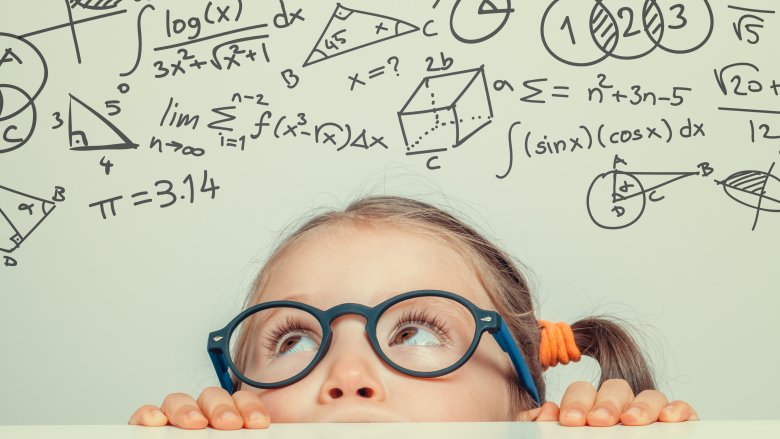The Secret To Becoming Good At Math
For many, math is like a malfunctioning Platform 9 ¾ — no matter how hard you try, you just end up running into a wall that puts you flat on your butt. There are those who are "blessed" and there are all the rest, struggling with simple arithmetic while the advanced mathematicians go on to earn six figures with trophy husbands and wives, fast cars, and gold-plated abacuses.
Yet, some argue that math ability is simply something to be learned through hard work and practice. At the very least, there are things anyone can do to improve their basic math abilities, and they start with basic, foundational skills. For example, Sciencing tells us to start with memorization, such as multiplication tables. Sure, it helps with basic stuff, like how many pieces of toast you need per year for avocado toast, but more importantly, it shortens the process of performing more complex equations, allowing you to take on more complicated problems. Having to calculate 6 x 5 every time you needed to would be like typing out an entire URL, "https://" and all, rather than just getting straight to the "www."
Think about any action or skill you've learned. Do you think about all the individual processes required to walk down the street? Do you think about lifting one leg after another, bending at the knee while swinging your arms side to side? Of course not. You just walk, because your mind has grouped the basic processes into one fluid action. This is why memorization and rote repetition in math is so important. It helps transform a bunch of overwhelming, complicated actions into one smooth, beautiful motion.
Learning the language of math
Like when you learn a new language, or how to walk, you also need to practice whatever math skill you're going to use. According to American Scientist, many well-regarded scientists actually consider mathematics a language, all the way back to Galileo, who said "[The universe] cannot be read until we have learned the language and become familiar with the characters in which it is written. It is written in mathematical language."
This article by Barbara Oakley, author of A Mind for Numbers: How to Excel at Math and Science (Even If You Flunked Algebra) points outs that American mathematics education emphasizes active discussion over repetition, which is the equivalent of learning a large vocabulary of words in a foreign language but never trying to speak fluently. We look down on countries with education systems that make students spend hours going over and over problems. But the difference is that this model of learning is emphasizing fluency, which ultimately helps your brain group more complex problems and equations into "chunks," the same way we learn letters, then words, sentences, and paragraphs.
Using these methods, Oakley went from a 26-year student of foreign language who avoided math at all costs to a college professor of engineering. Her story is proof that you don't have to limit yourself based on what you think you can and can't do. Immersion is the quickest path to fluency, and if we consider math a language, immersion is essential.
The secret is simple: math practice makes perfect
So how can we begin to immerse ourselves in math, day to day? Start by removing your math crutches, like digital clocks and other tools that perform simple calculations for you. Your brain is a muscle and it needs to be worked out.
Be accountable. Do your homework, not because you have to, but because it is what will give you the experience needed to actually become fluent in the language of math. And when you get a question wrong, rather than beating yourself up, figure out why. By doing this thoroughly, you'll ensure that mistakes aren't repeated, and that your skills grow over time. When all else fails, don't be ashamed to ask for help. Education.com also emphasizes the importance of being willing to ask for assistance when stumped. If not, your misunderstanding will snowball over time. There's nothing to be ashamed of when trying to learn, and questions are the most direct route to understanding.
Performing the basic skills of memorization and repetition in a way that helps you "chunk" your learning will help form a foundation you can build upon over time, ensuring you're never limited by your math ability. It's worth it.


